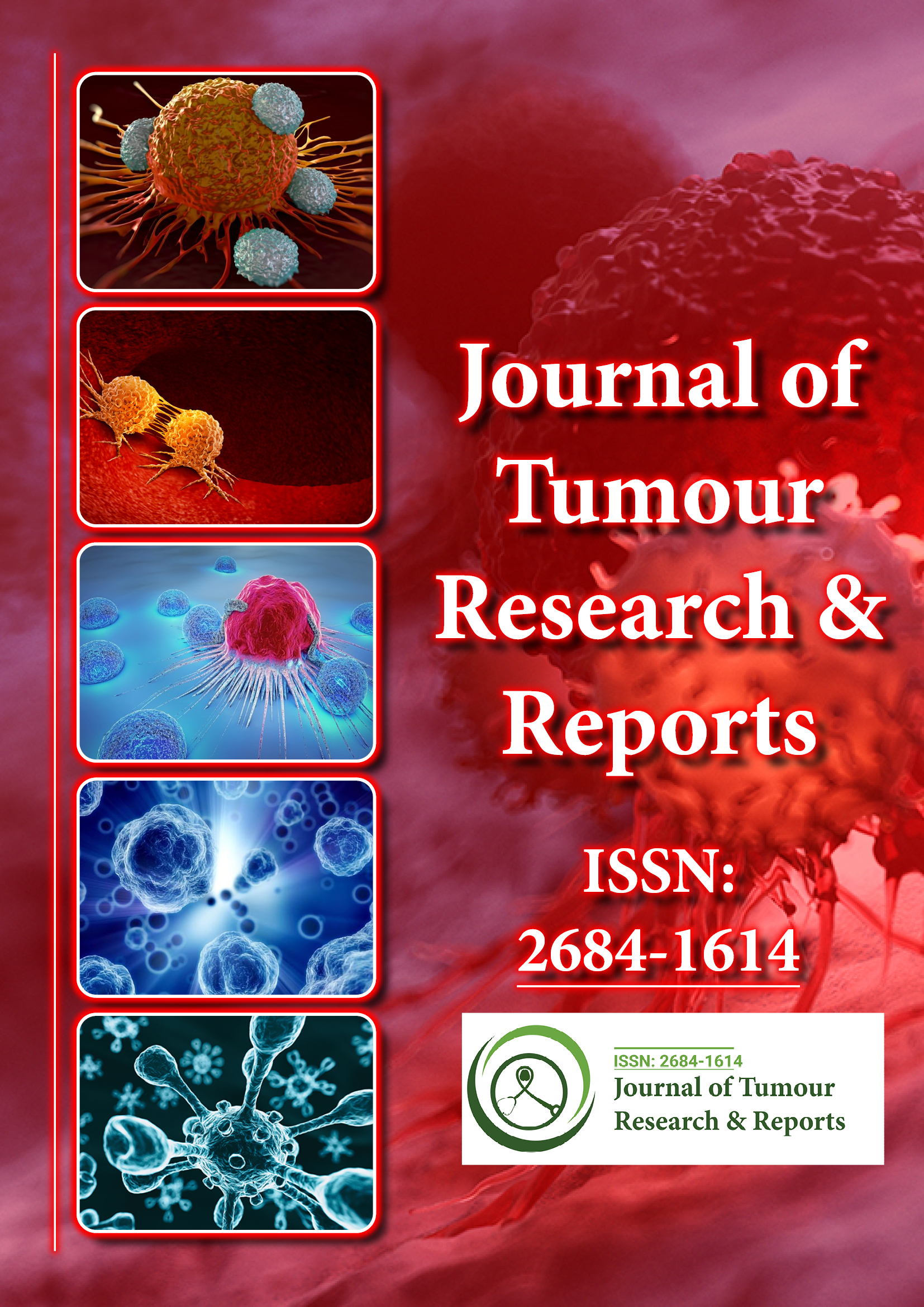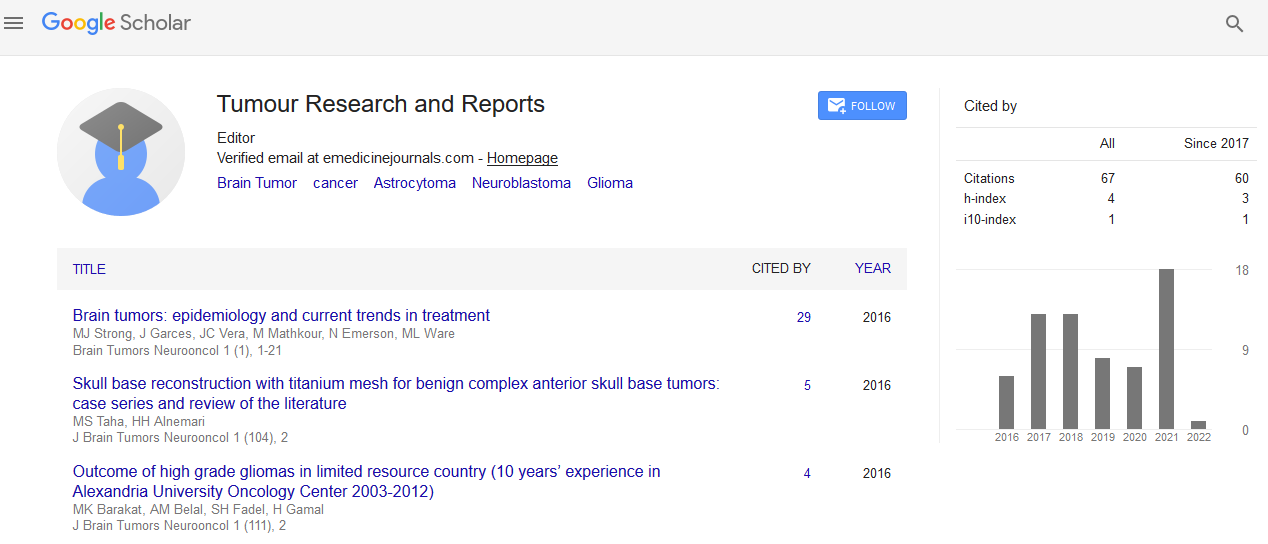Indexed In
- RefSeek
- Hamdard University
- EBSCO A-Z
- Google Scholar
Useful Links
Share This Page
Journal Flyer

Open Access Journals
- Agri and Aquaculture
- Biochemistry
- Bioinformatics & Systems Biology
- Business & Management
- Chemistry
- Clinical Sciences
- Engineering
- Food & Nutrition
- General Science
- Genetics & Molecular Biology
- Immunology & Microbiology
- Medical Sciences
- Neuroscience & Psychology
- Nursing & Health Care
- Pharmaceutical Sciences
Commentary - (2023) Volume 8, Issue 2
Targeted Therapies in Colorectal Cancer: The Role of Tissue-Specific Promoters
Calaf Francisco*Received: 24-May-2023, Manuscript No. JTRR-23-22034; Editor assigned: 26-May-2023, Pre QC No. JTRR-23-22034 (PQ); Reviewed: 12-Jun-2023, QC No. JTRR-23-22034; Revised: 20-Jun-2023, Manuscript No. JTRR-23-22034 (R); Published: 28-Jun-2023, DOI: 10.35248/2684-1614.23.8.190
Description
Colorectal Cancer (CRC) is a common and deadly malignancy that affects the colon and rectum. Despite significant advances in treatment options, the prognosis for patients with advanced CRC remains poor. To address this challenge, researchers have been exploring innovative approaches to develop more effective and targeted therapies. The use of tissue-specific promoters in the context to CRC is of the potential strategy.
Tissue-specific promoters are DNA sequences that drive the expression of specific genes in a particular tissue or cell type. They play a significa n t role in regulating gene expression and maintaining tissue-specific functions.
Understanding tissue-specific promoters
Tissue-specific promoters are essential regulators of gene expression, ensuring that specific genes are only active in specific tissues or cells. They are typically found upstream of a gene and consist of binding sites for transcription factors that control gene activation. Tissue-specific promoters can be activated by specific signaling pathways or transcription factors that are present only in certain cell types. The specificity of these promoters allows for precise control of gene expression and enables tissue-specific functions.
Tissue-specific promoters have great potential for enhancing the effectiveness of treatment in CRC. Conventional cancer therapies often lack specificity, leading to the adverse effects on healthy tissues. Tissue-specific promoters offer a means to selectively target cancer cells while minimizing damage to normal tissues. By exploiting the unique characteristics of CRC cells, such as altered signaling pathways or transcription factor expression, it is possible to design therapies that specifically target cancer cells.
Promoter-based therapies in CRC
Promoter-based therapies involve the use of tissue-specific promoters to drive the expression of therapeutic genes selectively in cancer cells. Several strategies have been explored to leverage tissue-specific promoters in CRC treatment:
Suicide gene therapy: Suicide gene therapy involves introducing a gene into cancer cells that encodes an enzyme capable of converting a harmless prodrug into a cytotoxic drug. Tissuespecific promoters can be employed to ensure selective expression of the enzyme in CRC cells, leading to targeted activation of the prodrug within the tumour. This approach has shown potential in preclinical models and early-phase clinical trials, demonstrating tumour regression and improved patient outcomes.
Targeted gene therapy: Tissue-specific promoters can also be harnessed to deliver therapeutic genes specifically to CRC cells. By using a promoter that is active only in CRC cells, therapeutic genes such as tumour suppressors or apoptotic factors can be delivered to selectively induce cell death in cancer cells. This strategy offers the potential to enhance the efficacy of traditional chemotherapy or radiation therapy by augmenting the cytotoxic effects specifically in CRC cells.
Immunotherapy: Tissue-specific promoters can be used to enhance the specificity and efficacy of immunotherapy approaches, such as immune checkpoint inhibitors or Chimeric Antigen Receptor (CAR) T-cell therapy. By driving the expression of immune checkpoint inhibitors or CARs specifically in CRC cells, tissue-specific promoters can help overcome challenges associated with off-target effects and improve the therapeutic index of these treatments.
Challenges and future directions
While tissue-specific promoters contains immense potential in CRC treatment, several challenges need to be addressed for their successful clinical translation.
Specificity and efficiency: Ensuring the specificity and efficiency of tissue-specific promoters is significant for their clinical application. Promoter activity may vary across patients and disease subtypes, requiring careful selection and validation of appropriate promoters. Improving delivery methods and optimizing gene transfer techniques are also critical to maximize the efficiency of promoter-based therapies.
Resistance and tumour heterogeneity: CRC is characterized by tumour heterogeneity and the emergence of resistant clones. Tumour cells with altered promoter activity or downstream signaling pathways may evade the effects of promoter-based therapies. Combining promoter-based therapies with other targeted agents or personalized treatment approaches may be necessary to overcome resistance and improve treatment outcomes.
Safety considerations: Promoter-based therapies should be designed with safety considerations in mind. Off-target effects and potential toxicity to the normal tissues should be carefully evaluated and minimized. Long-term effects and potential implications on the patient's immune system and overall health require comprehensive investigation.
In conclusion, tissue-specific promoters hold significant promise in revolutionizing the treatment of colorectal cancer (CRC). These DNA sequences, which drive the expression of specific genes in particular tissues or cell types, offer a way to target cancer cells more precisely and reduce damage to healthy tissues.
Promoter-based therapies in CRC encompass various strategies, including suicide gene therapy, targeted gene therapy, and immunotherapy, all of which exploit tissue-specific promoters to selectively deliver therapeutic genes or drugs to cancer cells.
Citation: Francisco C (2023) Targeted Therapies in Colorectal Cancer: The Role of Tissue-Specific Promoters. J Tum Res Reports. 8:190.
Copyright: © 2023 Francisco C. This is an open access article distributed under the terms of the Creative Commons Attribution License, which permits unrestricted use, distribution, and reproduction in any medium, provided the original author and source are credited.

